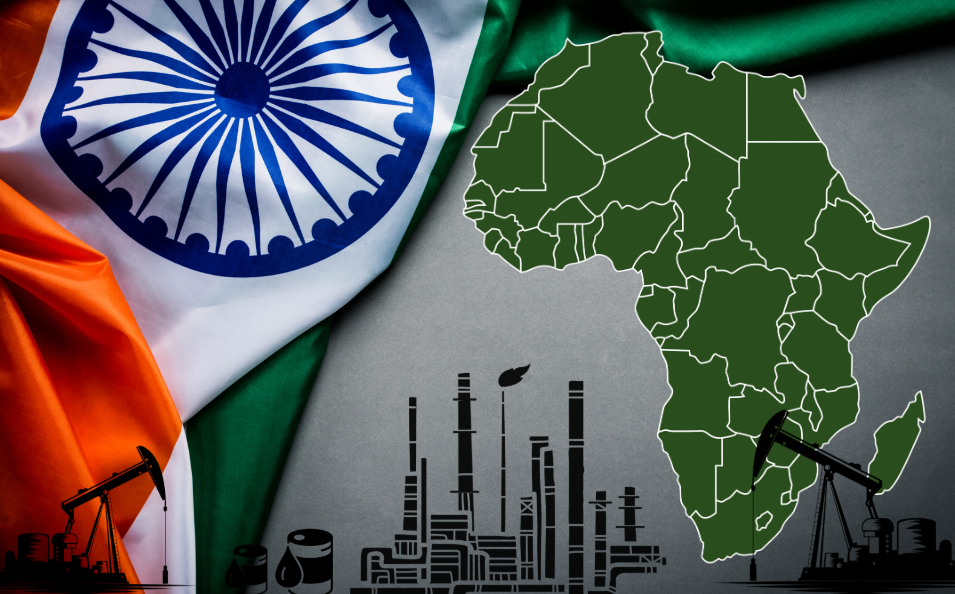Amid declining Russian oil imports and rising energy demand, India is ramping up investments across Africa’s oil, gas and renewables sectors — with African Energy Week 2025: Invest in African Energies set to deepen Africa’s partnership with this key G20 nation
India is increasingly turning to Africa as a strategic partner in its efforts to diversify energy sources and secure future supply. This shift in focus comes as India’s crude oil imports from Russia fell to a two-year low in February 2025, prompting a renewed push to diversify its sources of energy. According to Reuters, India’s oil imports from African nations rose dramatically to about 330,000 barrels per day (bpd) in February, more than doubling from 143,000 bpd in January.
This month, Indian Oil Corporation (IOC), one of the country’s top refiners, is set to receive two million barrels of Nigeria’s Okwuibome crude, alongside one million barrels each from Nigeria’s Akpo and Angola’s Mostarda fields. This growing engagement reflects Africa’s strategic position within the G20 framework, as the continent continues to strengthen ties with G20 countries and solidify its role as a key partner in global energy security.
New Investments
India’s shift toward Africa is also being seen through its latest investments. Last month, ONGC sanctioned a $175 million loan to support the Area 1 Mozambique Project. Three Indian state-run companies – ONGC Videsh, Bharat Petroleum Corporation Ltd. (BPCL) and Oil India Ltd – hold a combined 30% stake in the project. The project targets 75 trillion cubic feet of recoverable natural gas, with Area 1 encompassing major gas fields such as Windjammer, Barquentine, Lagosta, Camarão, Golfinho, Orca and Atum. In December 2024, BPCL announced plans to invest approximately $32.9 billion on its exploration and production blocks in Mozambique and Brazil, further solidifying India’s growing role in Africa’s energy landscape and showcasing its commitment to expanding energy partnerships on the continent.
The country is also turning its focus to Nigeria, where it has been involved in small-scale refining opportunities, including a chemicals and fertilizer plant, and made a $14 billion investment pledge in 2023. Speaking at CERAWeek in Houston last month, ONGC reaffirmed India’s focus on increasing investments in Africa, as well as the Middle East and Latin America. In response to this strategic shift, the Nigerian National Petroleum Corporation has urged Indian investors to capitalize on opportunities in Nigeria’s oil and gas sector, especially in refining and natural gas. With attractive reforms in place, Nigeria is eager to expand its refining capacity and reduce dependency on imported refined products.
Support for Renewables
In addition to fossil fuels, Indian companies are positioning themselves as key players in Africa’s energy transition to renewable sources. Egypt is currently in discussions with Indian renewable energy company ReNew Energy to develop a $8 billion green hydrogen project in the Suez Canal Economic Zone, aiming to produce 220,000 tons of green hydrogen annually upon completion and establish Egypt as a regional clean energy hub. Meanwhile, the International Solar Alliance’s (ISA) Global Solar Facility – which aims to provide clean energy access to 200 million Africans by 2030 – recently received a $25 million funding boost from the Indian government. ISA is working to replicate India’s solar energy success across Africa, with 30 solar-focused projects currently under development across the continent.
In parallel, Indian financial institutions are stepping up support for Africa’s renewable energy infrastructure. In December 2024, the Africa Finance Corporation (AFC) secured a $300 million syndicated loan from a consortium of Indian banks to fund renewable energy projects and broader infrastructure development across the continent. The deal marked a milestone in AFC’s efforts to diversify its international investor base, highlighting a growing appetite for African opportunities and introducing several Indian lenders to the continent – many of whom were participating for the first time.
Further Energy Collaboration
Amid this expanding engagement, African Energy Week 2025: Invest in African Energies will play a pivotal role in deepening India’s energy partnerships with Africa. The conference, taking place on September 29–October 3, 2025 in Cape Town, will feature high-level panels, deal signings, project showcases and investor forums aimed at fostering cross-border collaboration and partnerships.
With more than 10 African nations launching new licensing rounds and farm-in opportunities, the continent is becoming an increasingly attractive destination for Indian exploration and production firms. Additionally, downstream projects – including pipelines, refineries, and storage infrastructure – further enhance the scope for Indian investment. As India looks to diversify its energy sources and secure long-term supply chains, Africa presents a strategic opportunity to deepen its energy partnerships and expand its footprint in the global energy market.



Comments are closed, but trackbacks and pingbacks are open.